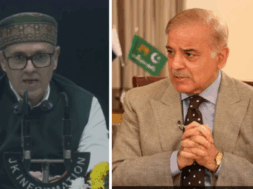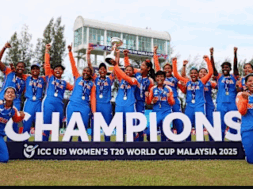
Single Phase Polling in Maharashtra, Double Phase in Jharkhand, Counting on November 23
Manas Dasgupta
NEW DELHI, Oct 15: Maharashtra state Assembly will go for single phase polling on November 20 and Jharkhand double phase polling on November 13 and 20 with the votes in both the states to be counted and the results declared on November 23, the Election Commission of India announced on Tuesday.
The ECI also announced by-elections for three Lok Sabha seats including in Wayanad in Kerala which was vacated by the Congress leader Rahul Gandhi and is expected to be contested by his sister and the Congress general secretary Priyanka Gandhi Vadra for her first foray in electoral politics, and 47 assembly seats in different states to go with the poll schedules in Jharkhand and Maharashtra.
While the term of the 288-member Maharashtra Assembly ends on November 26 and that of the 82-member Jharkhand Assembly ends on January 5, 2025.
The Chief Election Commissioner Rajiv Kumar said the by-election in Wayanad will be held along with the first phase polling in Jharkhand on November 13. Counting of votes will be along with the two states on November 23.
Mr Kumar explained that the elections to the Maharashtra state Assembly were not held along with Haryana earlier this month, as was in 2019, because of the security requirements for the Jammu and Kashmir Assembly elections.
In the 2019 Jharkhand election Chief Minister Hemant Soren’s Jharkhand Mukti Morcha – part of the Congress-led United Progressive Alliance had won 47 of the state’s 82 seats.
The political situation in Maharashtra has undergone a sea-change since the last state Assembly elections in 2019. The BJP and the then undivided Shiv Sena dominated, winning 161 of 288 seats. However, the alliance broke down over sharing of power and the Sena joined hands with the Nationalist Congress Party and the Congress to form the Maha Vikas Aghadi (MVA) government.
That government, however, lasted only till 2023; rebellions by the Sena’s Eknath Shinde – now the Chief Minister – and a few months later the NCP’s Ajit Pawar – now Mr Shinde’s deputy – forced then Chief Minister Uddhav Thackeray to resign and his coalition Maha Vikas Aghadi government to fall. Shinde faction of the Shiv Sena joined hands with the MVA to form the “Mahayuti” government which was later joined in by the Ajit Pawar faction of the NCP.
Looking ahead, the BJP – in power in Maharashtra now with the Sena and NCP factions that broke away from Thackeray and Sharad Pawar – will look to finish 2024 on a high after a set back the alliance faced during the historic April-June general election that though saw Narendra Modi become a three-time Prime Minister.
Mr Shinde will bank on his flagship scheme – Ladki Bahin Yojana, which sees poor women get a monthly stipend of ₹ 1,500 – to sway voters after his alliance’s poor show in the Lok Sabha election. The Mahayuti had won just 17 of the 48 parliamentary seats.
The ₹ 46,000-crore a year welfare scheme has been hailed as a ‘game-changer’, quite like the Ladli Behna Yogna of former Madhya Pradesh Chief Minister Shivraj Chouhan helped the BJP retain that state last year despite, again, anti-incumbency and widespread expectations of a Congress victory.
For the Congress, the Maharashtra and Jharkhand polls are critical after the Haryana defeat – in an election it was widely expected to win – and the slump in J&K, in which support for the NC from four independents means the Kashmiri party doesn’t actually need Congress support. The NC was later also backed by the lone Aam Aadmi Party MP in the former state.
Last week the Congress was leading as votes were counted in Haryana, but soon slipped behind and lost to the BJP. The party later said it could not accept the result, complaining (again) of malfunctioning Electronic Voting Machines (EVMs), and the EC’s “unexpected slowdown.”
After the Haryana loss the Congress was also slammed by its Maharashtra ally – Thackeray’s Sena faction. In an editorial in the party mouthpiece, it was flayed for failing to accommodate alliance partners or control “disobedience of local leaders.” The reference was to Haryana Congress leader Bhupinder Hooda, whose reported reluctance to ally with the state unit of the AAP, and share campaign space with fellow chief ministerial aspirant Kumari Selja, have been red flagged as possible reasons for the defeat.
The Thackeray Sena has faction insisted the Haryana defeat would not affect its relationship with the Congress’ state unit, but Sanjay Raut, other Sena (UBT) leaders, and those from other opposition parties have all urged the larger party to re-think its stance on seat-sharing.
“This attitude leads to electoral losses – ‘if we feel we’re winning, we will not accommodate regional party but, in states where we’re down, regional parties must accommodate us…” Trinamool MP Saket Gokhale posted on X.
In Jharkhand much of the poll rhetoric is likely to focus on the money laundering allegations surrounding Chief Minister Soren, who was arrested by the Enforcement Directorate on January 31. He secured bail in June after the Supreme Court said Mr Soren was not, prima facie, guilty.
Mr Soren has repeatedly denied charges against him, and has accused the ruling BJP of framing his arrest – weeks before the Lok Sabha poll – to derail the opposition. The JMM leader had resigned in dramatic circumstances before his arrest and installed aide Champai Soren in his place. After bail Hemant Soren resumed his position at the top but a hurt Champai Soren quit the JMM and has since joined the BJP.
On exit polls proving wrong, Mr Kumar said exit polls were causing distraction. He noted how exit polls have differed from the actual verdict. “We don’t govern exit polls. But there should self-introspection from media on the conduct of exit polls.”
He also flags the media for telecasting leads as soon as the counting commences. “This is nonsense,” he says pointing out that the results were published in the Election Commission website after a round is completed. He wonders if media publishes such “leads” just to claim their exit polls are correct.
The CEC also expressed concern on urban apathy. He pointed out how Colaba polled just 40% in Lok Sabha polls. Maharashtra, having a sizable urban population, the CEC said it was not a good sign. “We’ll do everything to address this,” he said.
Doda polled over 70%. “If they can vote, Colaba can also vote,” he said. He also noted how some posh localities in Faridabad and Gurugram polled around just 20%.











